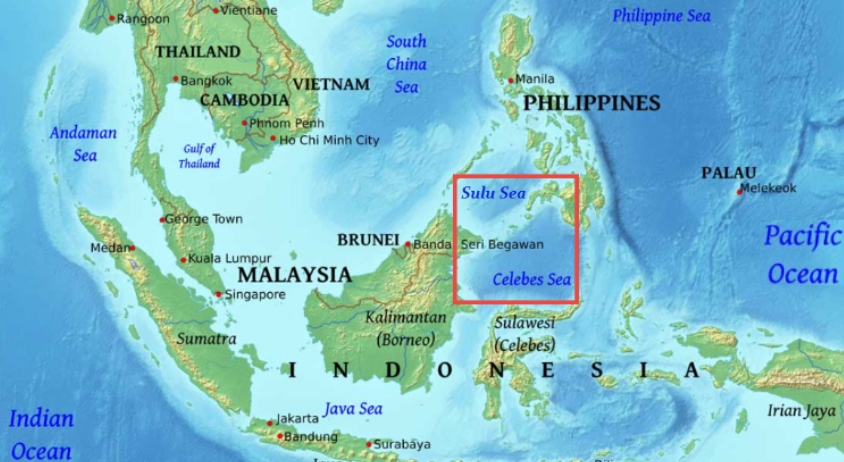Protecting from Sayyaf attacks
Published on: Thursday, January 17, 2019
By: Zam Yusa

KOTA KINABALU: Military measures alone will not reduce the risk of Abu Sayyaf kidnappings or terrorist transit in the Sulu and Sulawesi Seas off eastern Sabah, according to a report by an Indonesian think tank.
Regional initiatives such as the Trilateral Maritime Patrol (TMP) are useful for strengthening cooperation among the Indonesian, Malaysian and Philippine militaries but they are unlikely to have much impact on curbing violent extremism, says the report by Jakarta-based Institute for Policy Analysis for Conflict (IPAC).
ADVERTISEMENT
“The trilateral countries should focus more on analysing ASG [Abu Sayyaf group] networks in Sulu and Sabah, strengthening law enforcement and improving the sharing of information, especially from debriefings of extremist suspects,” says the report entitled “Protecting the Sulu-Sulawesi Seas from Abu Sayyaf Attacks”.
“The TMP began as a response to a rise in kidnappings at sea in 2016. The fact that most of the victims were Indonesians, the attackers were Filipino and the raids were sometimes in Malaysian waters underscored the need for cross-border cooperation.”Stay up-to-date by following Daily Express’s Telegram channel.
Daily Express Malaysia
ADVERTISEMENT
The lull in kidnappings stopped when two Indonesian fishermen were kidnapped from their fishing trawler in the waters near Pulau Gaya off Semporna on Sept 11 last year.
On Dec 6 also last year, three more fishermen – a Malaysian and two Indonesians – were abducted from their fishing boat in the waters off Kinabatangan. Both kidnappings are suspected to have been carried out by the Abu Sayyaf.
ADVERTISEMENT
The IPAC report says the move toward improved security cooperation between Indonesia, Malaysia and the Philippines is useful to the extent that it can help overcome distrust and improve communication among militaries in the region.
“Joint port visits, establishment of sea lane corridors, periodic joint training among militaries and more frequent communication are all desirable,” says the report.
“But policy-makers in the region need to be realistic. None of these measures will stop terrorism or kidnapping in the Sulu-Sulawesi sea. They may marginally improve security for commercial shipping when combined with the national coastal patrols, but they are all trying to provide a military answer to a problem that is not fundamentally military in nature.
“Kidnapping for ransom, whether on the high seas or on land, is not just an occasional crime in Basilan, Zamboanga and Sulu. It is a well-entrenched industry, with deep roots in local clan politics.
“Its eradication will depend on long-term political and economic reforms that include trying to simultaneously improve governance, provide alternative sources of income and try to make some dent in the woefully dysfunctional criminal justice system.”
The report argues that in the short-term, stepped up coastal patrols by national maritime police, where there is such a capacity, can be helpful as the Malaysian examples have shown, and strengthening police capacity here would be useful.
“Any programme to enhance maritime police capacity, however, is likely to run into turf problems with naval operations, especially when the trilateral patrol initiative has effectively declared maritime security to be an issue for the military, not law enforcement,” the report says
“To address both kidnapping and terrorism, the report says there is no substitute for good intelligence. The ins and outs of the ASG networks, the people they employ as spotters, their links to migrant communities in Sabah – none of this is going to come out of trilateral patrols or the ‘Our Eyes Initiative’.
“It is much more likely to come out of patient and repeated debriefings of individuals arrested – making it all the more important that kidnappers be arrested alive rather than just shot, with any information about networks and syndicates carefully analysed by appropriate agencies and shared with counterparts in neighbouring countries. It remains important to chip away at the legal, political and bureaucratic barriers to this sharing.”
Our Eyes is Southeast Asian nations’ intelligence pact to combat militancy and improve cooperation on security threats.
IPAC’s researcher Deka Anwar said it is critical to try and understand why these kidnappings at sea started, stopped and resumed. “It almost certainly had little to do with the TMP,” he is quoted as saying in IPAC’s website.
Deka notes that targeting Abu Sayyaf suspects for killing is not the answer to stopping maritime crime, since a new generation of fighters was already appearing.
“Anyone watching the Philippines should understand that as commanders are killed, their sons, brothers and nephews sooner or later will take their place, motivated by vengeance as much as profit,” he says.
The fresh kidnappings happened despite security boost in eastern Sabah following Sulu militants’ 2013 bloody intrusion in Lahad Datu to stake their territorial claim on part of Sabah.
The security boost measures included the gazetting of eastern Sabah as a special security zone and inception of a multi-agency security command, the Eastern Sabah Security Command or Esscom.
Esscom Chief Datuk Hazani Ghazali was reported as saying that it had thwarted dozens of piracy and kidnapping acts in eastern Sabah’s waters.
The most serious kidnapping, however, took place in 2000 when the Abu Sayyaf snatched 21 people, including westerners, from the renowned diving resort island of Sipadan. - Zam Yusa
Photo Credit : Aries Marine Insurance Brokers




